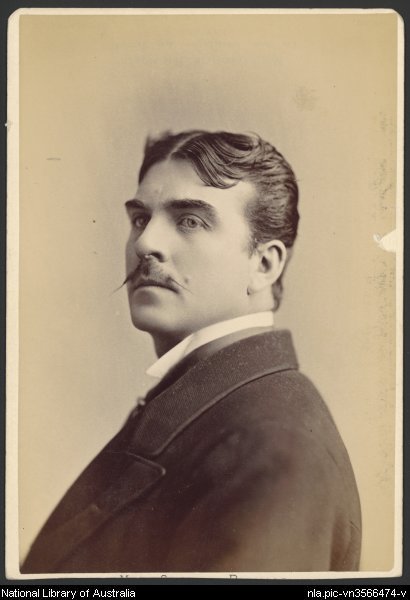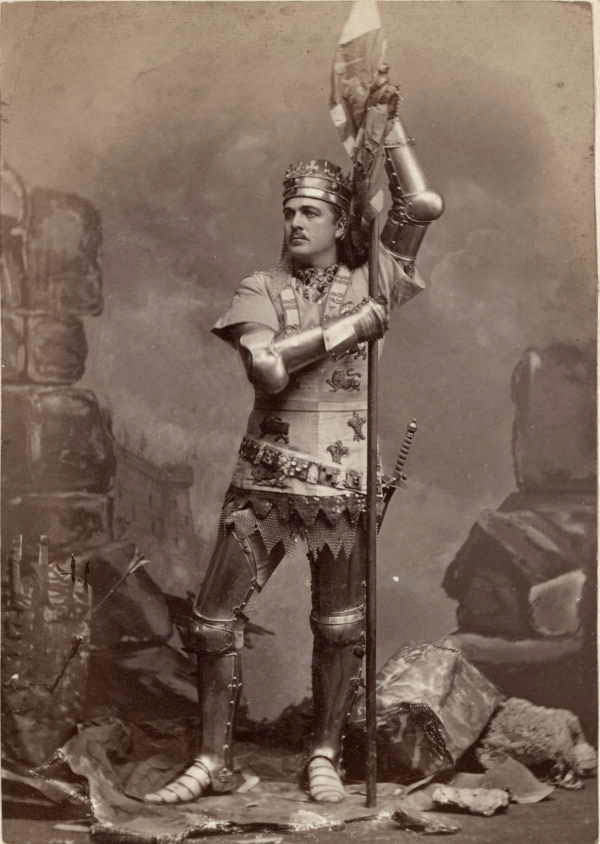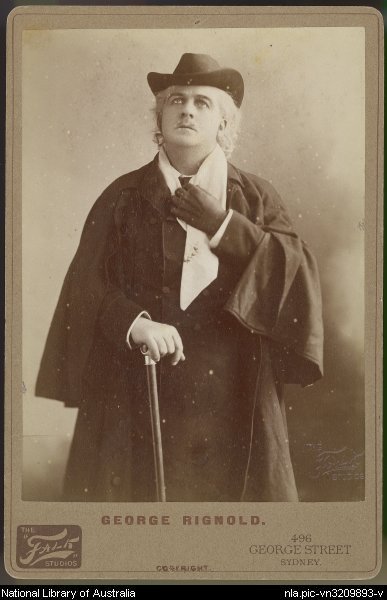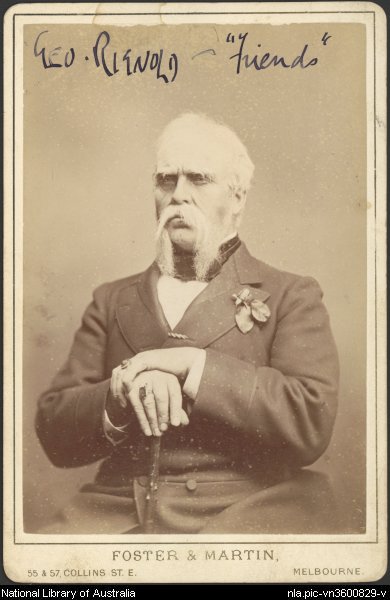The Dictionary of Sydney was archived in 2021.
The Dictionary of Sydney was archived in 2021.
Rignold, George
Citation
Persistent URL for this entry
To cite this entry in text
To cite this entry in a Wikipedia footnote citation
To cite this entry as a Wikipedia External link
Rignold, George
[media]Actor and manager George Rignold was born into a provincial English theatrical family named Rignall (but using Rignold as their professional name) in 1839. After family associations with theatres in Bristol and Bath, Rignold moved to the London stage in 1871. He arrived in Australia in 1876, following a successful season in New York, with a touring company organised by English manager Charles Calvert.
Rignold returned briefly to London in 1879 but, following a failed season at Drury Lane, he and his wife, comic actress Marie Braybrooke Henderson, finally settled in Sydney in 1884. [media]They were later briefly joined by his actor brother William and niece Betsy.
Through complex partnerships Rignold was associated with Her Majesty's Theatre for eight years from its opening on 30 September 1887. He was manager, lessee, performer and entrepreneur. Rignold was a big, burly, impressive and demanding man with an explosive temper. He was known as an exacting director. Early in his career the Bulletin christened him 'Gorgeous George', and he was physically ideally suited to heroic roles, many of which formed part of the extensive repertoire of spectaculars which had his particular stamp.
Rignold [media]had played the lead in Henry V in 1876, and he remained closely associated with the role throughout his life. Rignold's Shakespearean productions were staged in tableau fashion, and he edited and rearranged the text, particularly Henry V, to present the maximum of spectacle, with as many extras as possible, in scenes of famous places or events. His first local staging attracted enormous houses to a display of what the Sydney Morning Herald called 'poetical patriotism', and there were numerous revivals, often in response to a perceived patriot cause, until his last production of the play in 1901 during the Boer War. He also staged Julius Caesar, Macbeth, The Merry Wives of Windsor, A Midsummer Night's Dream and in 1899 even Othello.
[media]Commercial realities, however, meant most seasons were composed of the latest British military melodramas, usually starring Rignold. Paul Merritt and Augustus Harris's Youth was a perennial favourite and the Sims and Pettit hit In the Ranks, produced in 1887–88, ran for a 14-week season, setting a record for a non-musical play in Sydney. Rignold also appeared as Mephistopheles in Goethe's Faust and as the villain in Called Back. His Christmas pantomimes were surefire hits.
[media]Always an Anglophile, Rignold established and retained the support of the powerful and respectable of the colony both personally and for his business. He had little interest in Australian stories or writers, although from 1888 he did produce some work as a dramatist himself. He had an unexpected success with his last play at Her Majesty's in 1895, a local work titled Joseph of Canaan, but the Bulletin at least considered the appeal was the spectacle not the content.
Rignold appears to have suffered some form of medical collapse in 1897. [media]After his wife's death in February 1902, he retired to a house on Middle Harbour, which he named Braybrook, and lived in semi-seclusion. He performed only occasionally, making his last appearance in August 1907 in Melbourne for his old friend Bland Holt. He remarried in October 1907 to Georgina Harriet Don, the daughter of George Coppin, but she died in 1911 and Rignold followed her a year later, in December 1912. A small plain sandstone slab marks his grave in Waverley cemetery.
References
Leah Mercer, 'A Worthy Scaffold – George Rignold's rewriting and staging of "Henry V"', Australasian Drama Studies, October 1993
Philip Parsons (ed) with Victoria Chance, 'Richard Fotheringham', Companion to Theatre in Australia, Currency Press in association with Cambridge University Press, Sydney, 1995
John West, Theatre in Australia, Cassell, Stanmore NSW, 1978








